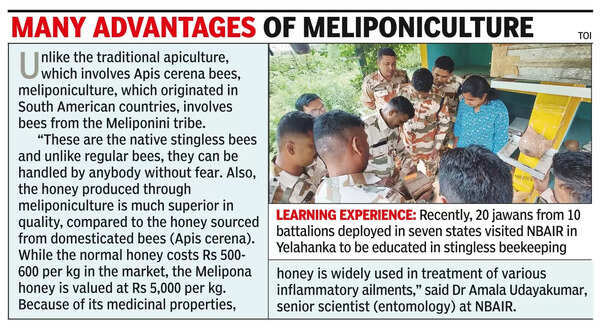- News
- City News
- bengaluru News
- These armed forces personnel safekeep borders & bees
Trending
These armed forces personnel safekeep borders & bees

Captivated by the techniques of Meliponiculture (farming of stingless bees), demonstrated by scientists of the National Bureau of Agricultural Insect Resources (NBAIR), DIG Rana Yudhvir Singh decided to introduce stingless beekeeping practice among the jawans.Over the past week, 20 jawans from 10 battalions deployed in seven states visited NBAIR in Yelahanka to gain hands-on experience in stingless beekeeping. The jawans had both theory and practical classes on the NBAIR Yelahanka campus, which has an abundant floral diversity. The entomologists’ team, comprising AN Shylesha, TM Shivalingaswamy, T Prabhulinga, and Amala Udayakumar taught them techniques of setting up bee boxes, capturing colonies, multiplication of colonies and their maintenance.

Wherever, whenever
According to the scientists, meliponiculture is fast catching up as a practice across India and is the chosen method of apiary in Kerala and the northeastern states. All the jawans trained last week were youngsters and wanted to practise it wherever their battalions were located. “Much to our surprise, they wanted to practise beekeeping in their battalions, besides training other jawans. They were also keen to make use of Melipona honey that was produced by these bees internally within the battalion as part of the healthy nutritious diet,” said a senior entomologist, NBAIR.
Dr Udayakumar, senior scientist (entomology), NBAIR, further said jawans can practise it wherever they are posted, provided the region has enough diversity of flora. “Generally, bees are capable of foraging within a 1-2km radius from their hives. Depending on the floral diversity, the personnel can harvest honey any time of the year. However, spring season ensures considerable yield with a minimum of 600 to 700 gm of honey per harvest per hive,” the scientist explained.
“We wish to expand the activity to other battalions for promotion of meliponiculture,” ITBP DIG Singh said.
SN Sushil, director of NBAIR, Bengaluru, threw light on NBAIR’s readiness to handhold the battalions in the adoption of meliponiculture and also offered to extend training in biocontrol and its compatible technologies for pest management.
We also published the following articles recently
PAUs plan bee works, Pb honey output up by 49%
Discover how Punjab's honey production surged by 49.28% in the past 10 years, ranking it third in India. Thanks to Punjab Agricultural University's introduction of the Italian bee variety Apis Mellifera. Despite success, the industry grapples with issues of honey adulteration that require attention.
Discover how Punjab's honey production surged by 49.28% in the past 10 years, ranking it third in India. Thanks to Punjab Agricultural University's introduction of the Italian bee variety Apis Mellifera. Despite success, the industry grapples with issues of honey adulteration that require attention.
Arrest of fake RPF jawan blows lid off 'recruitment racket' in Kalyan
Discover how a 22-year-old man's arrest exposed a fake job racket involving promising jobs in RPF. Learn how he and others were cheated out of money with false promises of employment and training. Read more about the unfolding investigation into this fraudulent operation.
Discover how a 22-year-old man's arrest exposed a fake job racket involving promising jobs in RPF. Learn how he and others were cheated out of money with false promises of employment and training. Read more about the unfolding investigation into this fraudulent operation.
J&K encounter: Two Army jawan, four terrorists killed in gunfight in Kulgam
Twin encounters in Kulgam district, Jammu and Kashmir resulted in the deaths of four terrorists and two Army soldiers. Security forces continue the operation against the terrorists. Recent months have seen a rise in terrorist activities in the region.
Twin encounters in Kulgam district, Jammu and Kashmir resulted in the deaths of four terrorists and two Army soldiers. Security forces continue the operation against the terrorists. Recent months have seen a rise in terrorist activities in the region.
End of Article
FOLLOW US ON SOCIAL MEDIA










